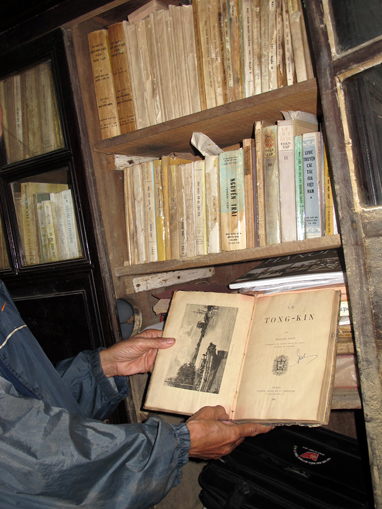Hue researchers are selling their rare books for large sums to outsiders, who often take them out of Vietnam, causing an irreparable loss to the city’s and country’s cultural heritage.
Private collectors, particularly those from abroad, are now hunting and offering attractive sums for these precious old books.
The researchers who sell their treasured books defend their actions, claiming they lack the finances and means to protect the books from daily wear and tear. They also protest that the availability of new translations and digitalized editions of the treasured books obviates the need to preserve them. However, their most common excuse is the need for money to cover living expenses.
According to the researchers who sold their books, they often fetch attractive prices. Magazines published in the south prior to 1975 such as “Ngay nay” (Today), “Dat nuoc” (The country), “Gio moi” (Fresh winds), and “Van nghe” (Literature and arts), sell for some VND100,000 (US$5) for each issue. Each volume of Nam Phong magazine fetches between VND600,000-1 million (up to $48).
Literary books printed before 1945 are bought for VND1.5-2 million (up to $95) each. Kings’ literary books sell for VND5-20 million (up to $952) apiece. Such magazines as “Dong Duong” (Indochina) and Bulletin des Amis du Vieux Hue (B.A.V.H., Bullentin by Friends of Ancient Hue) as well as historical materials sell for millions of dong provided they are in good condition. Bronze books that once belonged to the Nguyen Phuoc lineage, the Nguyen Kings’ (1802-1945) descendants, can easily go for well over VND200 million ($9,520) apiece.
Researcher T. N. recently sold a number of his prized books and magazines, including those published in Hue before 1945 and several rare books from the early 20th century, to get money to fix his house.
“It really pains me to sell the books but I have no other choice,” said N.
P.T., who owns one of Hue’s largest book collections, said he recently sold several old books for over VND30 million to repair his house as well.
“The books are really invaluable. I spent several sleepless nights agonizing over whether to sell them or not, but finally had to part with them,” T. shared.
Hue is the former capital of the Nguyen dynasty (1802-1945), the country’s last monarchy. It is home to several library-size private book collections, such as those owned by scholar Dao Duy Anh, pioneering Hue researcher L.Cadière, and several local Catholic monasteries and Buddhist facilities.
Hue locals have managed to preserve their book collections through historical upheaval, war, flooding, and the humid climate. However, large book collections are dwindling as they are gradually bought by outsiders and moved out of Hue and even Vietnam.
Late last year, B., a Vietnamese American, bought a number of rare books that were released by the Nguyen dynasty’s scholar office in the 19th century from several local researchers. He also managed to buy books on Vietnam by foreigners that were published in the 19th and early 20th centuries. B. has brought all of the books back to his home in the US.
Among the sold books is “Cours de Caracteres Chinois a L’usage des Francais” (Course of Chinese Characters for French Use), an extremely rare book authored in 1875 by famed scholar Truong Vinh Ky.
In mid 2013, the entire set of Nguyen Van Vinh’s 1920 translation of “Les Misérables” (The Miserable Ones) by Victor Hugo was sold to an expat Vietnamese collector in Europe. B., the original owner of the set, agreed to exchange the books for a batch of books worth $7,000, including two books of photography by Pierre Dieulefils titled “Annam-Tonkin” and “Cambodge.”
Precious research materials have also been sold to foreign researchers and collectors in large numbers.
Researcher Nguyen Huu Chau Phan, who owns one of Hue’s largest book collections, said he has been offered tempting prices for many of his 10,000 books. But he adamantly refuses to sell them, and has made his book collection open to the public for free.
“I’m scared to think that Hue will be drained of its book heritage in the coming years,” Phan said.
“We can’t blame researchers for selling the books. With translations and new and digitalized editions published, century-old books are mostly artifacts now. Also, the researchers are getting older while the next generations show little interest in preserving the books,” said cultural researcher Buu Y.
He urged that Hue University, Hue Cultural Museum, the province’s library, and university libraries buy the books for in-depth research.
“The ‘export’ of cherished books is really a huge loss to the country’s heritage as well as local researchers. Few had access to the books when they were still in Vietnam, let alone abroad,” said Dr. Nguyen Thi Hau.
She also stressed that original rare materials, especially historical ones, are likely to be faked if they are not officially recognized as rare editions.


















































